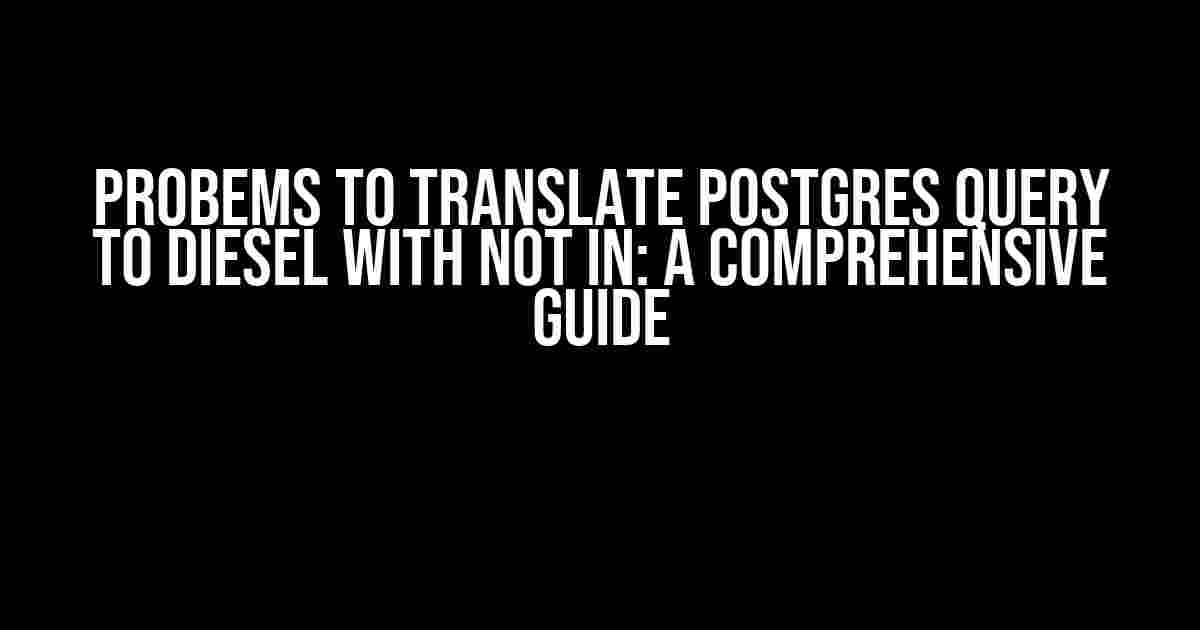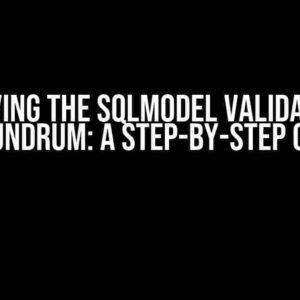Are you stuck with converting a Postgres query to Diesel, specifically when it comes to handling the NOT IN clause? You’re not alone! In this article, we’ll delve into the common problems that arise when translating Postgres queries to Diesel, focusing on the NOT IN clause. We’ll provide clear explanations, examples, and solutions to get you back on track.
Understanding the NOT IN Clause
In Postgres, the NOT IN clause is used to exclude rows that match a list of values. For instance, consider the following query:
SELECT * FROM users WHERE id NOT IN (1, 2, 3)This query retrieves all users except those with IDs 1, 2, or 3. Simple, right?
The Problem: Translating NOT IN to Diesel
Now, let’s try to translate this query to Diesel:
use diesel::{prelude::*};
use diesel::pg::PgConnection;
let conn = PgConnection::establish("postgres://user:pass@localhost/db").unwrap();
let users = users.filter(users::id.not_in(vec![1, 2, 3])).load(&conn).unwrap();If you run this code, you might expect it to work, but you’ll encounter an error:
error[E0599]: no method named `not_in` found for enum ` diesel::expression::operators::IsNull` in the current scopeThat’s because Diesel doesn’t provide an out-of-the-box solution for the NOT IN clause. Let’s explore the reasons behind this and how to overcome it.
Reasons Behind the Not-In Problem
There are several reasons why Diesel doesn’t support the NOT IN clause directly:
- Type Safety**: Diesel enforces strong type safety, which makes it difficult to implement a generic
NOT INclause that works for all types. - Query Optimization**: Diesel’s query builder is designed to optimize queries for performance. Implementing a naive
NOT INclause could lead to inefficient queries. - SQL Compliance**: Diesel aims to be compliant with SQL standards. The
NOT INclause is not part of the SQL standard, and its behavior can vary across databases.
Solutions to the NOT IN Problem
Don’t worry, we’ve got you covered! Here are some workarounds to translate your Postgres query to Diesel:
Using NOT EXISTS
One approach is to use the NOT EXISTS clause, which is equivalent to NOT IN in many cases:
let users = users.filter(users::id.ne_all(Exists(users.filter(users::id.eq_any(vec![1, 2, 3]))))).load(&conn).unwrap();This query uses a subquery to exclude rows that match the IDs 1, 2, or 3.
Using NOT EQUAL
Another solution is to use the NOT EQUAL operator (!=) with a folded list of values:
let users = users.filter(users::id.ne(1) .and(users::id.ne(2)) .and(users::id.ne(3))).load(&conn).unwrap();This approach is straightforward but becomes cumbersome for large lists of values.
Using NOT IN with Raw SQL
If you’re comfortable with raw SQL, you can use Diesel’s sql_query function to execute a custom query:
let users = diesel::sql_query("SELECT * FROM users WHERE id NOT IN ($1, $2, $3)")
.bind(1)
.bind(2)
.bind(3)
.load(&conn).unwrap();This approach bypasses Diesel’s query builder and executes the raw SQL query directly.
Best Practices for Handling NOT IN
To avoid common pitfalls when working with the NOT IN clause, follow these best practices:
- Use NOT EXISTS or NOT EQUAL when possible**: These clauses are more efficient and easier to optimize than raw SQL queries.
- Avoid large lists of values**: If you need to exclude a large number of values, consider using a subquery or a separate table to store the excluded values.
- Optimize your queries**: Use Diesel’s query builder to optimize your queries and minimize the impact of the
NOT INclause. - Test your queries**: Verify that your translated queries produce the correct results and optimize them accordingly.
Conclusion
Translating Postgres queries to Diesel can be challenging, especially when it comes to the NOT IN clause. By understanding the reasons behind the problem and using the workarounds provided, you’ll be able to overcome these hurdles and write efficient, robust Diesel queries.
| Problem | Solution |
|---|---|
| NOT IN clause not supported | Use NOT EXISTS, NOT EQUAL, or Raw SQL |
| Type safety concerns | Use Diesel’s type-safe query builder |
| Query optimization issues | Optimize queries using Diesel’s query builder |
| SQL compliance concerns | Use SQL-compliant clauses like NOT EXISTS |
By following the best practices and solutions outlined in this article, you’ll be well-equipped to tackle the challenges of translating Postgres queries to Diesel, including the tricky NOT IN clause.
Frequently Asked Question
Having trouble translating PostgreSQL queries to Diesel, especially when it comes to NOT IN? Don’t worry, we’ve got you covered! Here are some frequently asked questions and answers to help you navigate this challenge.
How do I translate a PostgreSQL NOT IN query to Diesel?
To translate a PostgreSQL NOT IN query to Diesel, you can use the `not_in` method provided by Diesel. For example, if you have a query like `SELECT * FROM users WHERE id NOT IN (1, 2, 3)`, you can translate it to Diesel like this: `users.filter(users::id.not_in(vec![1, 2, 3]))`. Easy peasy!
What if I have a subquery in my NOT IN clause? How do I translate that to Diesel?
Ah-ha! Subqueries can be a bit trickier, but still totally doable! In Diesel, you can use the `not_exists` method to achieve the same result. For example, if you have a query like `SELECT * FROM users WHERE id NOT IN (SELECT id FROM banned_users)`, you can translate it to Diesel like this: `users.filter(diesel::not_exists(banned_users.select(banned_users::id)))`. Boom!
Can I use NOT IN with an array of values in Diesel?
Absolutely! Diesel supports arrays out of the box, so you can easily use `not_in` with an array of values. For example, if you have an array of IDs `[1, 2, 3]`, you can use it like this: `users.filter(users::id.not_in(ids_array))`. Note that `ids_array` should be a valid Diesel array expression.
How do I handle NULL values when using NOT IN in Diesel?
When using NOT IN in Diesel, you need to be mindful of NULL values, as they can cause unexpected results. To handle NULL values, you can use the `is_not_null` method in combination with `not_in`. For example: `users.filter(users::id.is_not_null().and(users::id.not_in(vec![1, 2, 3])))`. This ensures that only non-NULL values are considered in the NOT IN clause.
Are there any performance considerations when using NOT IN in Diesel?
Yes, there are! When using NOT IN in Diesel, it’s essential to consider the performance implications. Large arrays or subqueries can impact query performance. To mitigate this, consider indexing the columns involved in the NOT IN clause, and use efficient query planning. Additionally, consider alternative query approaches, such as using EXISTS or JOINs, depending on your specific use case.




